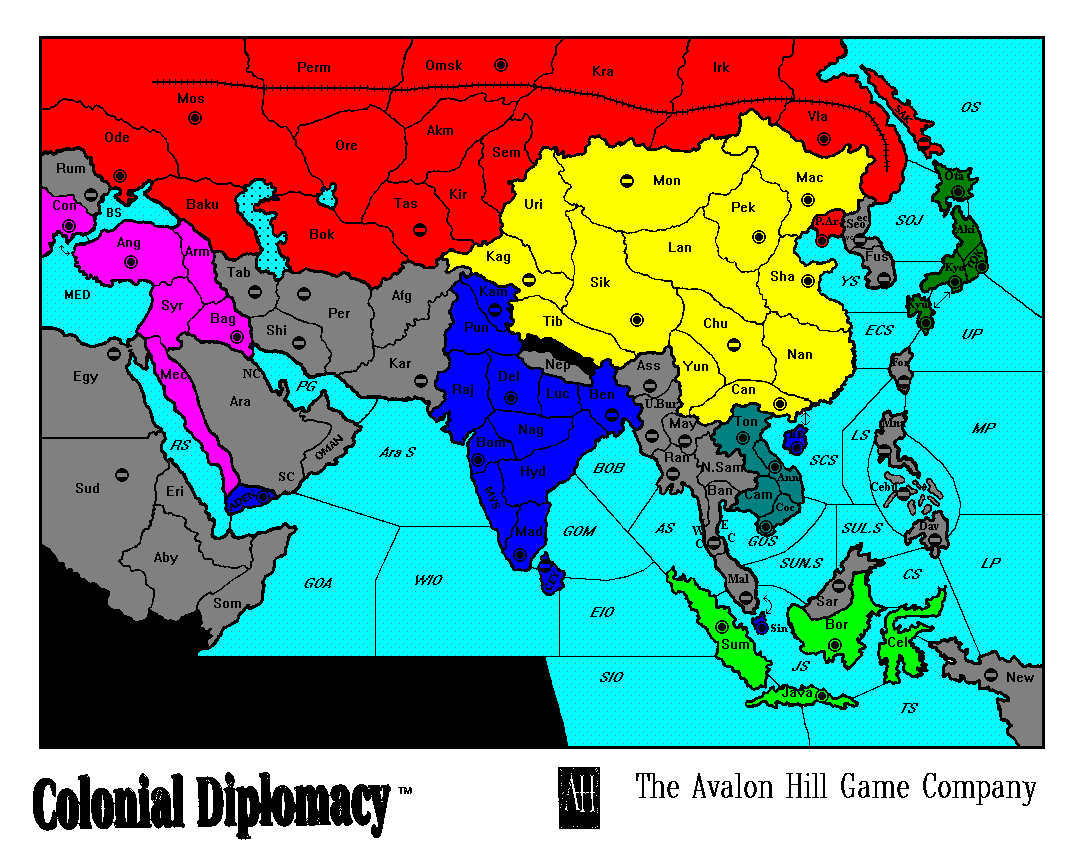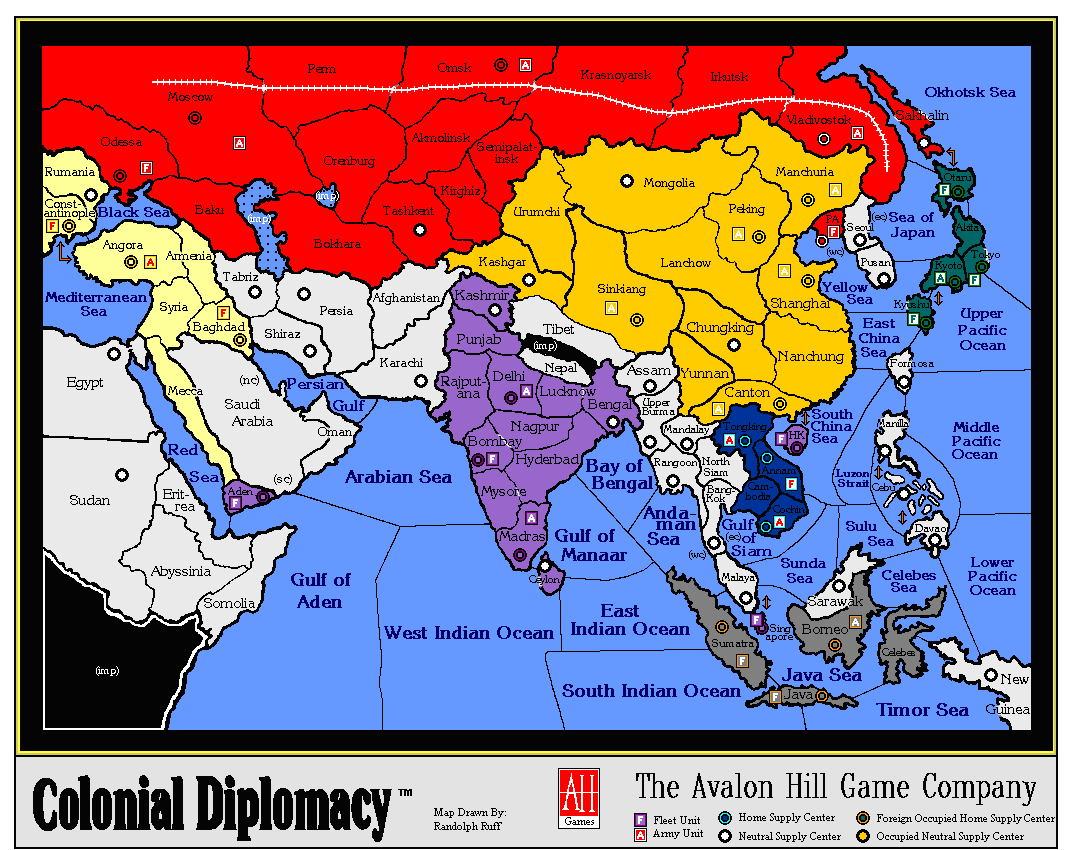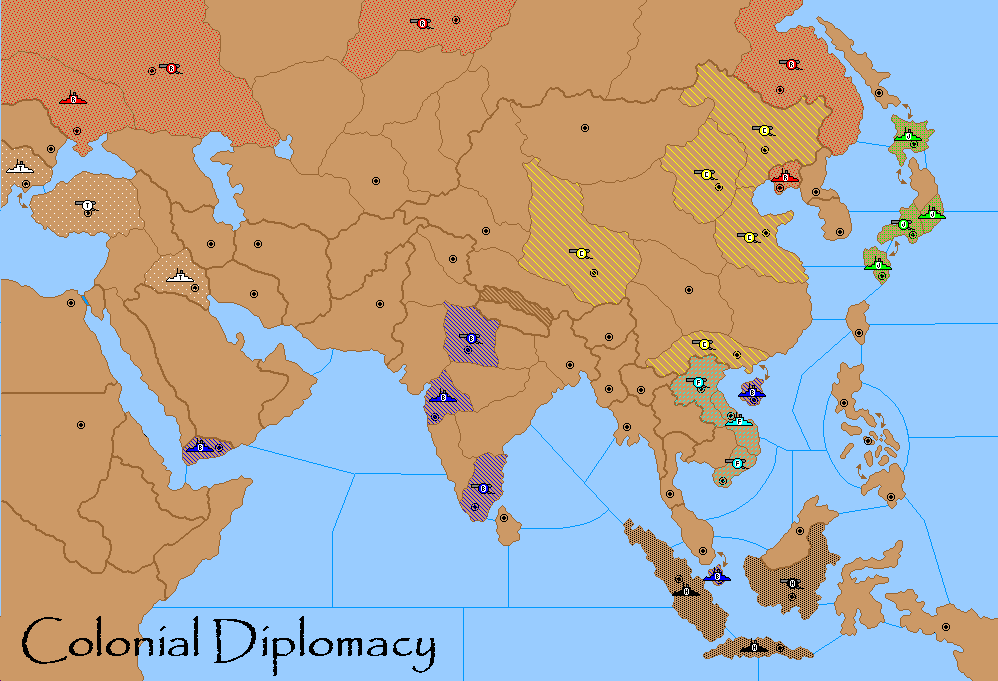Difference between revisions of "Colonial"
(New page: The Colonial Diplomacy variant of diplomacy follows the most of the rules as standard diplomacy with a modified map, and (someday) with 3 optional rules which can be set on or off at the G...) |
|||
| Line 140: | Line 140: | ||
Colonial Strategy Articles: | Colonial Strategy Articles: | ||
| − | [[CDD Lab Notes]] | + | *[[CDD Lab Notes]] |
| − | [[Colonial Diplomacy Review]] | + | *[[Colonial Diplomacy Review]] |
| − | [[Colonial Diplomacy Part 1 The British]] | + | *[[Colonial Diplomacy Part 1 The British]] |
| − | [[Colonial Diplomacy Part 2 The Chinese]] | + | *[[Colonial Diplomacy Part 2 The Chinese]] |
| − | [[Colonial Diplomacy Part 3 The Dutch]] | + | *[[Colonial Diplomacy Part 3 The Dutch]] |
| − | [[Colonial Diplomacy Part 4 The French]] | + | *[[Colonial Diplomacy Part 4 The French]] |
| − | [[Colonial Diplomacy Part 5 The Japanese]] | + | *[[Colonial Diplomacy Part 5 The Japanese]] |
| − | [[Colonial Diplomacy Part 6 The Russians]] | + | *[[Colonial Diplomacy Part 6 The Russians]] |
| − | [[Colonial Diplomacy Part 7 The Turks]] | + | *[[Colonial Diplomacy Part 7 The Turks]] |
Revision as of 15:22, 7 January 2008
The Colonial Diplomacy variant of diplomacy follows the most of the rules as standard diplomacy with a modified map, and (someday) with 3 optional rules which can be set on or off at the GM's desire. The game is the first commercially published true simple Diplomacy variant.
Variant Rules:
1) Except as noted below, the standard rules of play for Diplomacy apply.
2) There are 7 great powers. The starting units are as follows:
B-BRITAIN
A Madras A Delhi F Bombay F Hong Kong F Singapore F Aden
C-CHINA
A Peking A Canton A Sinkiang A Shanghai A Manchuria
F-FRANCE
A Tongking F Annam A Conchin
H-HOLLAND
F Java A Borneo F Sumatra
J-JAPAN
A Kyoto F Kyushu F Otaru F Tokyo
R-RUSSIA
A Moscow A Vladivostok A Omsk F Odessa F Port Arthur
T-TURKEY
A Angora F Baghdad F Constantinople
3) There are three optional rules which cannot be listed here because the Hasbro copyright applies. Plus, they haven't been coded up yet! Trans Siberian Railroad and Rules Errata
4) CEBU looks like a body of water with islands inside of it, which is
accurate. It is analogous to Kiel, Constantinople or Denmark in the
standard diplomacy.
5) The Caspian Sea, Lake Baykal and any other unnamed space is
not passable.
6) There are 58 supply centers. The victory criterion is possession of 30
supply centers at the end of any Fall retreat.
7) The game begins in 1870.
8) This version of Colonial is based on the Moulmein Convention, so land
bridges have been added between Otaru and Akita, and Sakalin and Otaru.
Note that this may not be implemented on your particular Judge, so that
any moves generated by Realpolitik using these land bridges may not be
accepted.
Province Abbreviations:
All land province are abbreviated by the first three letters of the province,
except the following:
hk Hong Kong kag Kashgar kam Kashmir mac Manchuria may Mandalay mna Manila gui New Guinea prs Persia prm Perm part Port Arthur sig Singapore sik Sinkiang ubur Upper Burma
Sea Space abbreviations are less obvious, but there is a pattern.
All sea spaces which take the form Sea of #Something or Gulf of ##Something
take the abbreviation so# or go#. For example, Gulf of Manaar is "gom" and
Sea of Japan is "soj".
All sea spaces which take the form ###something Sea or ###something Gulf
take the abbreviation ###s. For example, Persian Gulf is "perg" and Sulu
Sea is "suls".
All sea spaces which end in Ocean or no water designation (such as Lower
Pacific) are abbreviated by their initials. For example, Lower Pacific is
"lp" and West Indian Ocean is "wio".
If there is no conflict, you may be able to use initials even if the sea
rules say otherwise. For example, the Okhotsk Sea is "okhs" but "os" will
also work.
Colonial Strategy Articles:
- CDD Lab Notes
- Colonial Diplomacy Review
- Colonial Diplomacy Part 1 The British
- Colonial Diplomacy Part 2 The Chinese
- Colonial Diplomacy Part 3 The Dutch
- Colonial Diplomacy Part 4 The French
- Colonial Diplomacy Part 5 The Japanese
- Colonial Diplomacy Part 6 The Russians
- Colonial Diplomacy Part 7 The Turks


